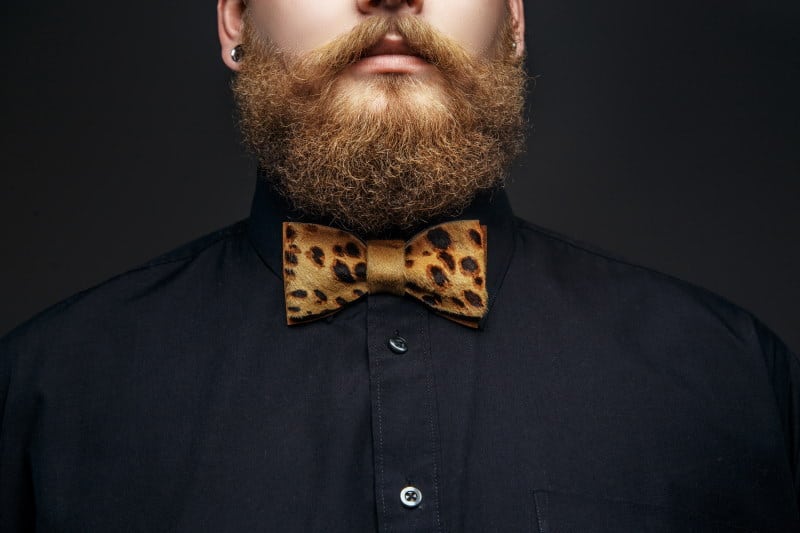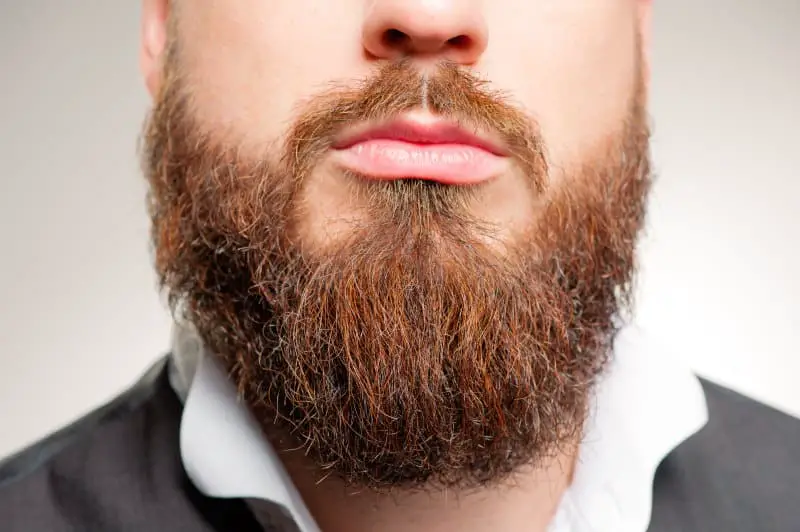With a head of rich brown or black hair, you’re probably expecting your beard to come in equally dark. It seems to check out. After all, if your hair is one color than the rest of your hair should be that color, too, right?
So it must feel pretty weird when you start to notice red hairs in your beard. But one or two discolored hairs isn’t anything to worry about. Only there’s a problem. Once you start to notice those hairs, you also notice that previously dark hairs are now starting to grow in red. What gives? There isn’t something wrong, is there?
Your beard turning red is not a sign of anything wrong with you, nor is it a sign that there is something wrong with your facial hair either. This is caused by a natural mutation of the genes. Red hair, as in head hair, occurs when someone has inherited two mutated MC1R genes. But having a single MC1R gene results in red hair growing only in some places on the body. This can be anywhere such as on your legs, in your armpits or even on your face. The genes for red hair can be present alongside the genes for brown hair (or any color) and these two genes “fight” to determine which will be produced. This can result in hair that changes color as the genes guiding growth switch places.
Stick around to learn more about the MC1R genes, how you didn’t know you had them and what to do about a red beard.
How a Single MC1R Gene Causes Your Beard To Turn Red
The scientific name for the MC1R gene is melanocortin 1 receptor. This gene produces a protein which has a direct affect on the melanin within the body. Melanin is most commonly understood as the pigment which determines whether we have light or dark skin. But many people don’t realize that melanin is also responsible for the color of our eyes and our hair.
The MC1R gene typically does not produce red hair. In regards to beards, it works to determine the levels of eumelanin and pheomelanin present in the body. Eumelanin is responsible for darker colors while pheomelanin produces lighter colors. When the MC1R gene is mutated it can produce red but to achieve this there needs to be less eumelanin than pheomelanin.
You can inherit two MC1R genes of the same color but often people inherit two because of differences between their parents. When the MC1R genes are not mutated it can result in blonde hair with a black beard or vice versa. But when one of the MC1R genes is mutated, red body hair is the result. If both were mutated then you would have red hair all over.
One of the things that surprised people about this is that they will often find their beard growing in red despite the fact that their parents show no signs of red hair. You might assume that because red hair is caused by a mutated gene it means that one of your genes has mutated since birth but this isn’t the case.
Red hair is what we call a recessive gene. These genes are inherited from our ancestors like all the rest but they are hidden because of more dominant genes. So while your parents may have a mutated MC1R gene, they have stronger genes for brown/black/blonde hair and this hides the presence of the mutation. It was always there, it just wasn’t clear to see.
I Don’t Want a Red Beard, What Can I Do?
You really only have three options when this happens. The first is to shave your beard. If you don’t want a red beard then removing the beard will fix the problem. But this isn’t very satisfying is it? Nah, I didn’t think so.
So how about something that lets us keep our beard?
The second option allows us to keep our beard without the red. You’ve probably already guessed that I’m talking about dying your beard. Just For Men has put out a line of great dyes that can help you to darken up your beard quickly. Plus you can even keep some of the red to give your beard a richer look. Try touch of gray to leave some red or use rich dark brown dye for full coverage.
The final option is to come to terms with your red beard and learn to enjoy it. It helps to make you unique so you stand out from the crowd. This can be a blessing in disguise and make you more memorable to both business and romantic partners.
Are There Other Factors That Can Change the Color of My Beard?
Of course there is. As you age, the hair follicles on your body (and your head) start to produce less melanin. This leads to changes in color. One of the more common is grey, though we’ll have more to say about that in a moment. It can also mean that your beard gets darker instead of lighter sometimes, as these changes don’t always happen the way they’re expected.
Exposure to sun and stress can also change the color of your hair. Certain soaps or facial products may also change the color of your beard, though this is determined more by your genetics and how your body reacts to the ingredients.
You may also see the color of your beard fading if you aren’t eating properly and maintaining your physical health, as it requires the right nutrients and minerals for your body to keep producing melanin.
Is This Why Beards Turn Grey?
Beards start to turn grey with age because of the reduced production of melanin. This has nothing to do with the MC1R genes that you have inherited from your parents. This is a natural process that happens as you age and you shouldn’t worry about it if you are 40+.

But if you are young and have started to notice grey or white hairs, this is often a sign that there is a problem that you should address. If you have been getting too much sun and see the hairs beginning to lighten, this isn’t necessarily a health problem but it is a sign that your beard hairs are weaker than they were previously. This makes it more likely that they will die sooner rather than later.
The bigger problem is when a younger person’s beard begins to turn grey without exposure to the sun or a lack of vitamins in their diet. When this happens it is a warning sign that they are under a lot of stress and the increased production of cortisol (the stress hormone) is having a detrimental effect on their health.
If this is the case then the color of your facial hair is the least of your problems: too much stress has been directly linked to increased blood pressure, increased risk of heart attack and a shorter life span.
Your beard changing colors may be the warning you need to start tackling your stress levels, so keep an eye on it when you’re taking care of it.
Can a Red Beard Change Color Back to Black/Brown?
While it is rarer that a red beard turns black or brown, it is possible. Often what you will experience if you have a single mutated MC1R gene is a combination of red hair with your other color.
This can result in a beard that grows in dark to turn red as it comes out or one which comes in red and then turns black. But another experience which is common is to have a period of your life with a beard of one color only to turn to another. This change will sometimes last the rest of your life but not always. As your hair changed color once, it can change color again.
However, you should not rely on this. It doesn’t always happen. If you are concerned about having a red beard, then you should shave or dye it rather than expect it to change again on its own.
Take a look at this video to find out what other celebrities you share your beard color with:
Conclusion
Your beard turning red might not be what you wanted out of life but it isn’t a sign that there is something wrong with you. All it means is that you have a mutated MC1R gene. This doesn’t affect your health in any way at all.
If you have a red beard, you can always dye it. But you should try rocking it for a bit. It might not have been what you were expecting but a red beard can be extremely attractive. Celebrities Michael C. Hall and Michael Fassbender both have red beards and they are considered extremely attractive by women. So don’t go shaving or dying it until you give it a chance to work some magic for you.

